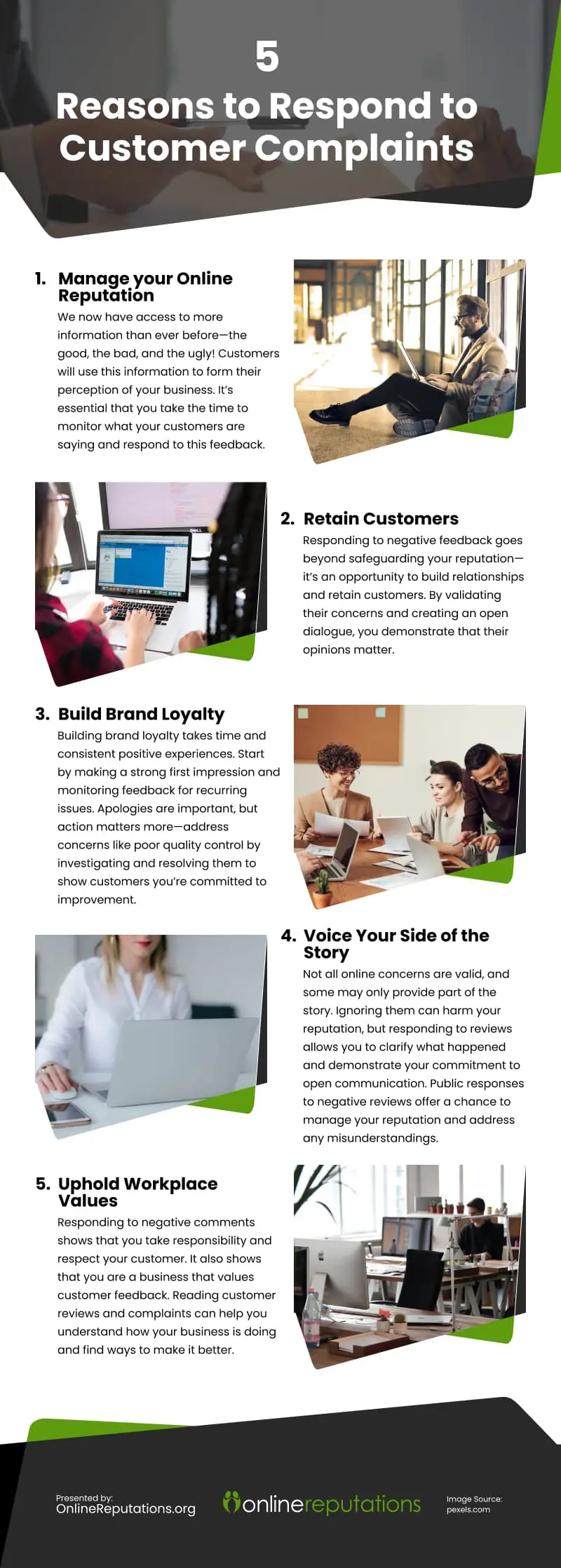We’ve all heard the saying: “Sticks and stones may break my bones, but words will never hurt me.” However, when it comes to online customer complaints, this advice couldn’t be further from the truth. Left unchecked, negative customer feedback will damage your business.
When handling customer complaints, the right answer is never to ignore them. You might not be able to change what happened, but you can control how you respond. In the customer’s mind, not responding is a response, and your silence speaks volumes.
Research shows that customers overwhelmingly favor businesses that respond quickly (within two to three days) to all reviews—positive or negative. Addressing negative feedback might not be fun, but it is essential in building brand loyalty and protecting your reputation among consumers. Read on for five reasons why responding to customer complaints is important.
1. Manage your Online Reputation
We now have access to more information than ever before—the good, the bad, and the ugly! Customers will use this information to form their perception of your business. It’s essential that you take the time to monitor what your customers are saying and respond to this feedback.
Improve your Ratings
Responding to all complaints helps you maintain your online business ratings. For example, how a business responds to complaints is one of the main criteria the Better Business Bureau (BBB) uses in issuing business ratings.
Reviews
Research shows that almost all consumers read reviews before purchasing a product or service. Therefore, negative reviews and user experiences will stand out to prospective customers. While you might not be able to remove negative reviews, you can respond to them in a way that helps build your brand and makes customers feel heard and valued.
SEO
Google shows reviews as part of its Google+ Local feature and often places them at the top of search results for businesses. Other review websites like Yelp and TripAdvisor also appear near the top when searching for a company or product. Your engagement with customers increases your visibility. Rather than trying to figure out how to remove negative content from Google, use this opportunity to have meaningful conversations with your customers.
2. Retain Customers
Responding to negative feedback isn’t just about protecting your reputation; it’s also about building relationships so you can retain your customers. One consumer’s negative experience doesn’t mean you have to lose them as a customer forever. Building relationships takes time and work. Figure out what’s working and what’s not to meet your customer’s expectations the next time.
Validating customers’ feelings while gathering feedback creates an open dialogue and builds trust. Even an unhappy customer may do business with you again if they feel their concerns were heard and addressed.
3. Build Brand Loyalty
Brand loyalty doesn’t happen overnight. It grows through a series of positive experiences where expectations are met. As stated earlier, one negative experience doesn’t have to derail that loyalty, unless you let it.
Making a strong first impression is important. If consumers scroll through your reviews and see lots of negative feedback being ignored, they are less likely to make a purchase. So monitor your feedback and look for recurring themes. Then take action on these issues. People want action, not just an apology. If consumers are complaining about poor quality control on your products, apologize but then look into their concerns and find a resolution.
4. Voice Your Side of the Story
Unfortunately, not all concerns voiced online will be valid, and sometimes they only tell part of the story. Customers may exaggerate in their reviews because they expect to get something in return. They might think that making the issue seem worse will lead to a negative reaction from your business. If these situations are ignored, it can hurt your company’s reputation.
By responding to a review, you can explain what happened and show that you’re willing to communicate openly—not just with the customer but with others who read the review. Issuing public responses to negative reviews is your opportunity to manage your reputation and clear up any misconceptions or concerns customers may have.
5. Uphold Workplace Values
Responding to negative comments shows that you take responsibility and respect your customer. It also shows that you are a business that values customer feedback.
Reading customer reviews and complaints can help you understand how your business is doing and find ways to make it better. Initially, it might be tough to read negative reviews but try not to take them personally. Instead, think of them as helpful feedback that can help you improve.
Responding to criticism is a critical part of building loyalty and protecting your brand. By accepting feedback and constructive criticism, you can help your business thrive.
Infographic
Always address customer complaints instead of ignoring them. While you can’t change the past, you can control your response. Handling negative feedback is vital for building brand loyalty and protecting your reputation. Discover five reasons in this infographic why responding to complaints is essential.

